

Untitled. The Cold War for Kids. The Cold War was a long period of tension between the democracies of the Western World and the communist countries of Eastern Europe.
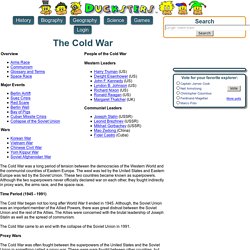
The west was led by the United States and Eastern Europe was led by the Soviet Union. These two countries became known as superpowers. Although the two superpowers never officially declared war on each other, they fought indirectly in proxy wars, the arms race, and the space race. Time Period (1945 - 1991) The Cold War began not too long after World War II ended in 1945. The Cold War came to an end with the collapse of the Soviet Union in 1991. Proxy Wars The Cold War was often fought between the superpowers of the United States and the Soviet Union in something called a proxy war. Arms Race and Space Race The United States and the Soviet Union also tried to fight the Cold War by demonstrating their power and technology. Activities Crossword Puzzle Word Search For reference and further reading: The Cold War (20th Century Perspectives) by David Taylor. 2001. The Cuban Missile Crisis.
The Cuban Missile Crisis was one of the few times that the ‘rules’ of the Cold Warwere nearly forgotten.
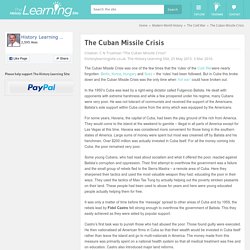
Berlin, Korea, Hungary and Suez – the ‘rules’ had been followed. But in Cuba this broke down and the Cuban Missile Crisis was the only time when ‘hot war’ could have broken out. In the 1950’s Cuba was lead by a right-wing dictator called Fulgencio Batista. He dealt with opponents with extreme harshness and while a few prospered under his regime, many Cubans were very poor. He was not tolerant of communists and received the support of the Americans.
Causes of the Cold War in 1945. Cold War chronology. 1945 : ‘A’-Bomb dropped on Hiroshima + Nagasaki.
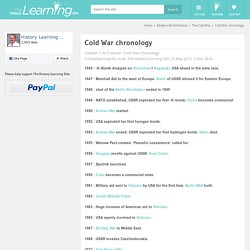
USA ahead in the arms race. 1947 : Marshall Aid to the west of Europe. Stalin of USSR refused it for Eastern Europe. 1948 : start of the Berlin Blockade – ended in 1949 1949 : NATO established; USSR exploded her first ‘A’-bomb; China becomes communist 1950 : Korean War started. 1952 : USA exploded her first hyrogen bomb. 1953 : Korean War ended. 1955 : Warsaw Pact created. 1956 : Hungary revolts against USSR. 1957 : Sputnik launched. 1959 : Cuba becomes a communist state. 1961 : Military aid sent to Vietnam by USA for the first time. 1962 : Cuban Missile Crisis. 1963 : Huge increase of American aid to Vietnam. 1965 : USA openly involved in Vietnam. 1967 : Six-Day War in Middle East. 1968 : USSR invades Czechoslovakia. 1973 : Yom Kippur War. 1979 : USSR invaded Afghanistan. 1986 : Meeting in Iceland between USSR (Gorbachev) and USA (Reagan). Sting - Russians Song Analysis. Encore une autre explication qui complète l'ensemble...
Russians cours site. Sting :"Russians" - Collège Mathias Grunewald de Guebwiller. ANALYSE D’ŒUVRE : « Russians » de STING 1-l’auteur ; Sting, de son vrai nom Gordon Matthew Thomas Sumner, né le 2 octobre 1951 à Wallsend, près de Newcastle (nord de l’Angleterre), est un musicien et chanteur anglais, ardent défenseur des droits de l’homme et soutien d’Amnesty International depuis plusieurs années.
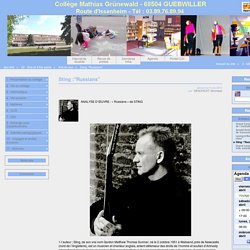
Brièvement instituteur et occasionnellement acteur de cinéma. Avant sa carrière solo, il était le chanteur et bassiste du groupe the POLICE. Russians sting. HDA Russians - Jul'Arts. Mardi 28 mai 2 28 /05 /Mai 10:57 Russians de Sting: 3°1,2 et 4 MMes Chaulet, Dolbeau et Martin Liens avec: La java des bombes atomiques de Boris Vian (1954) Docteur Folamour de Stanley Kubrick (1964) Prokofiev: suite du lieutenant Kije (1933) Massacre en Corée de Picasso (1951) Lien internet: East Side gallery link HDA Russians par Jul'Arts Par Jul'Arts - Publié dans : Histoire Géographie.
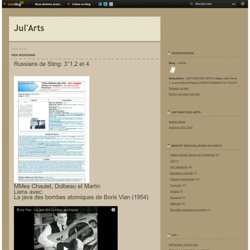
Russians 7 strophes avec des rimes par 2. Sting (1951 - ...) Russians (1985) Le XXe siècle en musique : Sting, Russians (1985) et Boris Vian La java des bombes atomiques (1955) - Le blog histoire des arts. Paroles : Sting Musique : Sergei Prokofiev extrait de l’album The dream of the blue turtles 1985 In Europe and America there's a growing feeling of hysteria Conditioned to respond to all the threats In the rhetorical speeches of the Soviets Mister Krushchev said, 'We will bury you' I don't subscribe to this point of view It'd be such an ignorant thing to do If the Russians love their children too How can I save my little boy From Oppenheimer's deadly toy?
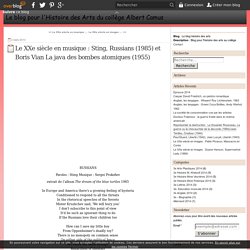
There is no monopoly on common sense On either side of the political fence We share the same biology Regardless of ideology Believe me when I say to you I hope the Russians love their children too Cette chanson, écrite en 1985, est un point de vue occidental de la fin de la guerre froide. Lorsque la chanson sort, elle est déjà « historique » puisque les dirigeants dont il est question ont été remplacés. NB : Oppenheimer est le physicien qui a inventé la bombe atomique. V1p Expose Sting. Une autre approche.